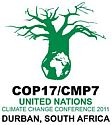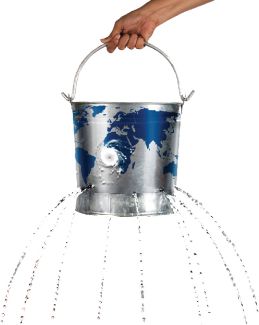by Colin Chartres, former Director General of IWMI

 Water and climate change: Time to act
Water and climate change: Time to act
As the negotiators, activists and journalists have left South Africa at the end of the United Nations (UN) Climate Change Conference, the crucial role of water in mitigation and adaptation strategies remains to be addressed. Much of the discussion in Durban focussed, quite rightly, on a political solution to the thorny issue of curbing greenhouse gas emissions. However, climate change is already a reality for water resources, agriculture and food security in many parts of the world. Its impacts are now tangible on the natural resources and ecosystems upon which many of the world’s poor depend on for their livelihoods.
Whatever mitigation arrangements the United Nations Framework Convention on Climate Change (UNFCCC) ultimately come up with, it is an inescapable fact that climate change will almost certainly become more extreme. Yet, the major countries can’t seem to get their houses in order to do anything significant about mitigation in the short term. Thus, unless we want to see increasing levels of food insecurity and further deprivation of the poor, we have to focus on adaptation, and because of its critical importance to life, that means putting water at the forefront of the adaptation strategies.
 After some advances in Durban, many observers are expecting the mechanisms for operating the Green Climate Fund to be agreed shortly. More cash for investment in adaptation measures may soon be available. I would strongly argue that a significant proportion of this money be committed to improved water resources management. Water is already becoming the critical limiting resource in many parts of the world. By 2025, the World Bank estimates that up to 3.5 billion people will be living in areas of acute water scarcity. Climate uncertainty can only add to the numbers at risk.
After some advances in Durban, many observers are expecting the mechanisms for operating the Green Climate Fund to be agreed shortly. More cash for investment in adaptation measures may soon be available. I would strongly argue that a significant proportion of this money be committed to improved water resources management. Water is already becoming the critical limiting resource in many parts of the world. By 2025, the World Bank estimates that up to 3.5 billion people will be living in areas of acute water scarcity. Climate uncertainty can only add to the numbers at risk.
Fortunately, we already have cheap and easy solutions to alleviating water stress. Improved rainwater storage and crop productivity are simple to implement, but are desperately needed in Africa. The power of such technologies to transform lives and build household resilience should not be underestimated.
Also, we should not forget that agricultural water issues are not solely rural. As more and more people move into cities, IWMI’s research on reusing urban wastewater for food production is demonstrating that this approach is potentially a ‘win-win’ situation for both food security and sanitation.
Policymakers, farmers and, above all, UN negotiators, need to take water management more seriously. We must come up with the means to fund improvements and invest in more research as we move towards a greener and, hopefully, a more climate-stable future.
Source: http://www.iwmi.cgiar.org
[hr top=”no”/]
Researchers Outline Food Security – Climate Change Road Map in Science
Modest advances for agriculture in Durban signal need for scientific input.
Download Press Release [PDF 98Kb]
The CGIAR’s Challenge Program on Water and Food, in partnership with IWMI, is organising a learning event on rainwater management at the Agriculture and Rural Development Day held alongside the UN Climate Change Conference in Durban South Africa on 3 December 2011. Details here
Supporting materials including fact sheets on groundwater, infield rainwater harvesting,small reservoirs, zai pits, rainwater management overview




